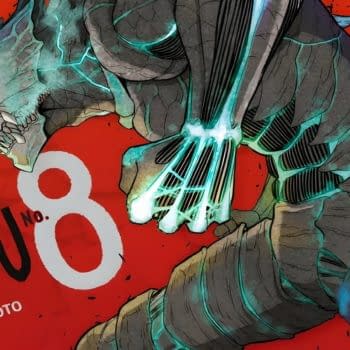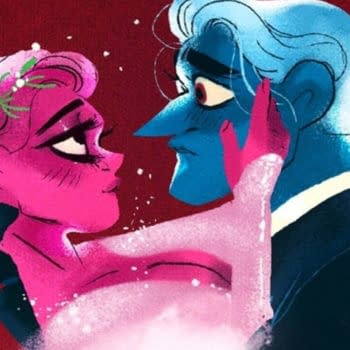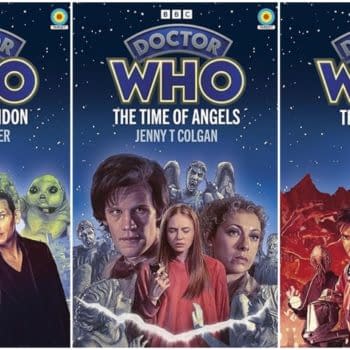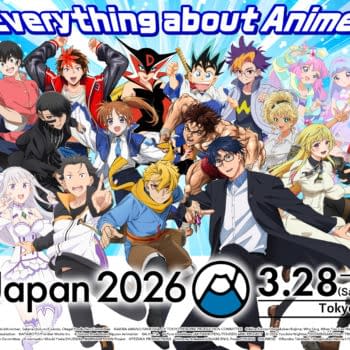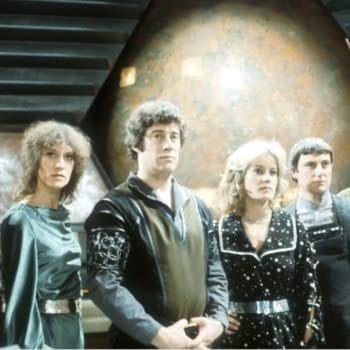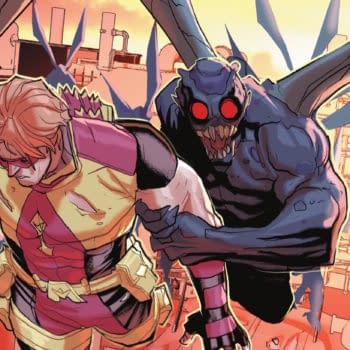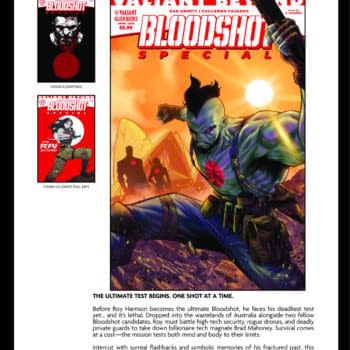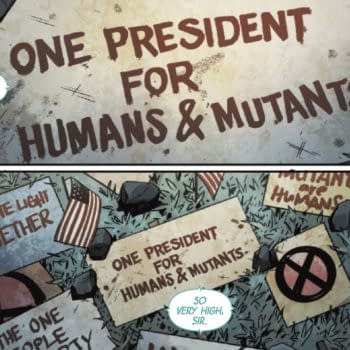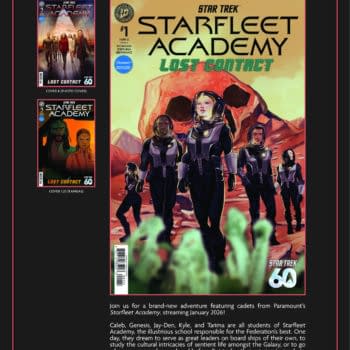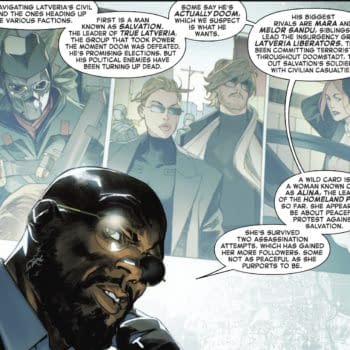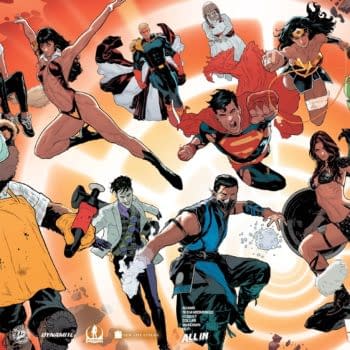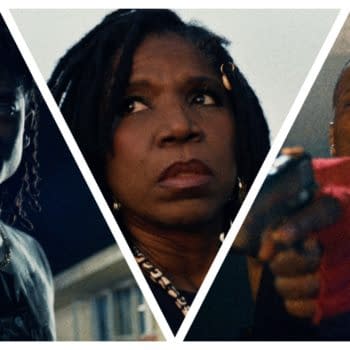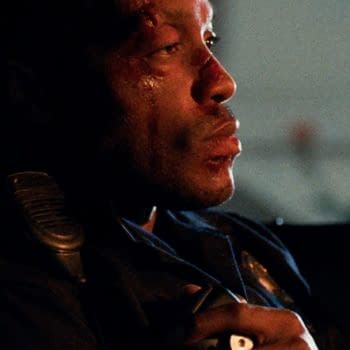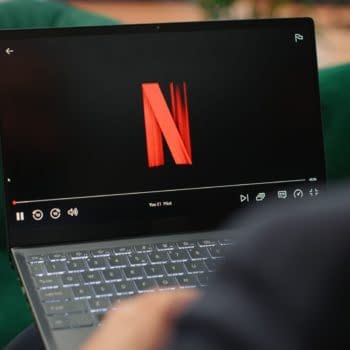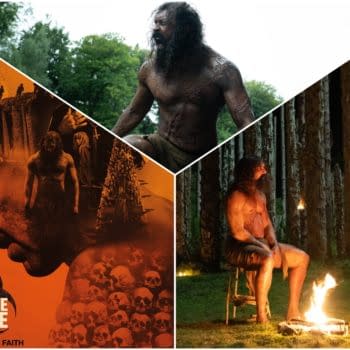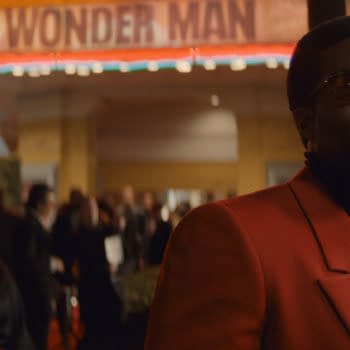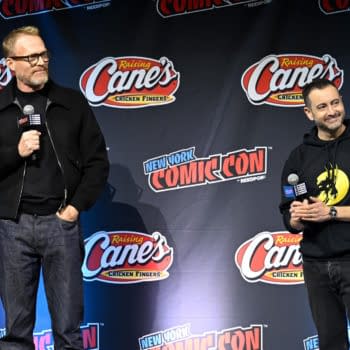Posted in: Comics, Movies | Tagged: comedy-drama, indie movie, Jesse Metcalfe, Johathan L. Bowen, the comic shop, vod
The Comic Shop: Interview with Writer-Director Jonathan L. Bowen
The Comic Shop is an overlooked indie comedy-drama out now, and writer-director Jonathan L. Bowen talks about the realities of filmmaking
Article Summary
- Discover the making of The Comic Shop, a heartfelt indie comedy-drama by Jonathan L. Bowen.
- Explore the personal inspirations and challenges faced by writer-director Bowen in filmmaking.
- Learn about the unique subgenre of movies set in comic shops and how Bowen's film stands out.
- Uncover insights into the current realities of indie filmmaking and casting strategies for success.
In The Comic Shop, disillusioned store owner Mike (played by Jesse Metcalfe of Desperate Housewives) and new-kid-in-town Brandon (newcomer Micah Giovanni) take such a liking to each other. As Mike faces difficult choices about keeping his store open and Brandon navigates a contentious relationship with his own father, these two new friends find ways to let their passion for comic books and comic art reveal unexpected paths forward. This is writer-director Jonathan L. Bowen's second indie feature film, a comedy-drama about second chances, redemption, and coming of age. We interviewed Bowen on how he made the film and the realities of indie filmmaking.
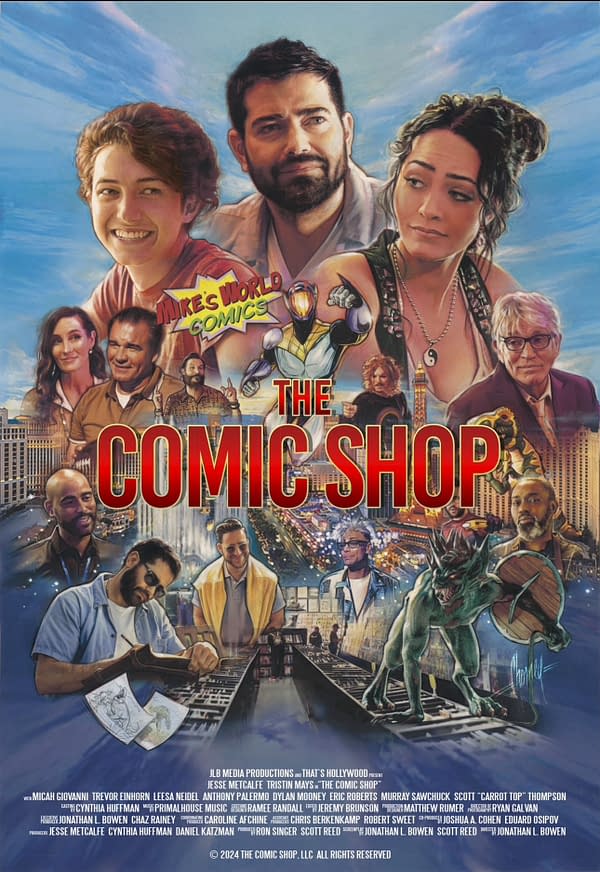
On How The Comic Shop Came to Be
Hi Jonathan, congratulations on getting The Comic Shop made, since it's generally a miracle when any movie gets made. You wrote in your personal statement about being inspired to write a better story and ending for a real comic shop owner you vaguely knew. The Comic Shop is about Mike's tale of redemption in his role as a mentor and surrogate father figure for a young man coming of age. Is this theme as personal to you as it felt like to Mike in the movie?
Thank you, and with all that goes wrong even before making a movie, you're right — it always feels like a miracle! Although a lot of details are heavily fictionalized, I consider The Comic Shop a deeply personal movie as Mike's struggles in middle age were based largely on my own. Instead of a comic shop, I was (and am) running a B2B video production company where because our work is nationwide, I'm rarely even involved in the projects. What started as a passion for filmmaking became just another job, like Mike at the comic shop, where I dreamed of returning to feature filmmaking, and Mike dreams of returning to professional illustrating.
There are some other parallels that I wanted to explore in the movie, which is the bittersweet feeling of new "content." When Mike receives new shipments of comics each month, of course, he's excited because he loves the medium and enjoys checking out whatever is new, but there's also a bitterness to consuming what other people create when he wants to be among the creators. That's also how I felt watching movies for a decade between directing, where I am a huge movie buff and love watching, but wanted to get back in the game myself. I am fortunate that my parents were always very supportive of my goals and dreams, but my mom passed away back in 2006 before I moved to Los Angeles to pursue film formally the next year.
Movies set in comic shops are a minor subgenre now but most of them are either geeky inside baseball joke fests or downbeat exercises in geek self-loathing, at least the ones from the 90s and early 2000s were. It's a relief that The Comic Shop is the type of life-affirming character comedy-drama that used to be common on network television in the 1970s and 1980s. Do you think being a bit of an outsider from comics fandom gave you a more objective point of view to just tell a story about people rather than nerd point-scoring?
I think so, yes. I grew up as a huge comic nerd, from Marvel to Image and cards to comics, action figures to collectibles. Eventually, though, I got more into film, and my nerdy side transferred over to Star Wars collecting, conventions, and being involved in the fan community. For The Comic Shop, I was focused on using the setting and the world of comics as a backdrop for a story about people just following their dreams and passions. I admit to being not entirely interested in portraying a perfectly realistic look into "the comic book world" of the present day. I still wanted to ground the story in reality, for instance, the struggle of many retailers during the pandemic and post-pandemic and the battle of independent labels versus giant corporations. It's not a documentary about the state of the industry, though I tried to do enough research to make it feel authentic for the story.
As we promote the movie and try to build an audience, of course I understand our core viewing group is people who love comics, geek culture, and art in general. That being said, I really wanted the movie to be accessible to mainstream audiences without any prior knowledge of comics, illustrating, or nerdy humor. I wanted people to be able to relate to the characters on their own terms, because the struggles each of them encounter are common among people in any field or situation. A father's attempt to relate to a child, a young man's struggle to make sense of what they want out of life, and the middle-age scrutiny of reality versus expectations.
A little aside, but I think relevant, a movie like The Comic Shop is allowed to be different from movies a few decades ago in the same subgenre because of the explosion of geek culture. When I was in high school almost 25 years ago now, any admission of being into something "geeky" could be social suicide, just as movies of the time depicted. There's a generational divide where people over a certain age may not have been exposed to such properties, but younger people have no problem proudly identifying as fans of different franchises. Think back to the '90s, when the shows "everyone was watching" or that absorbed media attention were shows like Friends, Seinfeld, and ER. In the last decade, the shows that everyone has talked about are more like Game of Thrones and The Walking Dead, based on comics. Far from being relegated to the margins, geek culture has dominated the conversation for some time now and taken the spotlight.
The Fifteen-Day Shoot Indie Filmmaking
Many low-budget indie films have fifteen-day shoots now. How did you manage that? Granted, you didn't have stunts, explosions, or car chases… it's mostly character drama scenes, but those still need time to feel right and emotionally true. You could say the real stunt was how authentic and lived-in the characters felt. Were you able to have rehearsals with the actors beforehand?
Yeah, we had a fifteen-day shoot as well, which was shaved down from an anticipated seventeen or eighteen days because of budgetary restrictions. We had character meetings with the key cast members, discussing their motivations and arcs, but we didn't have any auditions. Especially where name actors come into play, the availability for rehearsals is limited and also complicated by the entire cast (spare one) being in Los Angeles when the movie was shot in Las Vegas. Fortunately, filmmaking is such an arduous process that I always had plenty of time on set to go over each scene thoroughly before we shot. We had time to play with blocking (where actors stand and move), character interactions, and even the tone of the scene. For the most part, we had no issues with time, finishing slightly early or on time every day except for one (about fifteen minutes over our twelve-hour day — it was the convention day, of course, despite bringing two cameras that day).
As for how we managed such a tight shooting schedule, the biggest logistical challenge is what I'd call "paired locations," which can have two meanings. In other words, Brandon's house needs a room I can production design as Alex's apartment, an example of one physical location for us serving as two movie locations. The space to build out the convention area has to have a bowling alley attached (thank you, Silver Nugget Casino). The next example is proximity. The restaurant we're pretending is in San Diego has to be extremely close to the bar that Mike frequents — in fact, they were in the same parking lot! The park where Mike sketches must be close to Dan's office, another example of the second type of pairing where the locations are separate, but the move between them is minimally disruptive. A lot of locations are rejected not because they lack what we need, but because they lack a proper pairing. Beyond that, the key is precise planning and time management, so that we always know how much time we have for each scene. We allowed more time for more emotionally charged scenes, giving the actors the room they needed to deliver strong performances.
The Current Reality of the Movie Business
Hollywood is kind of a mess now, with low-budget and mid-budget movies being neglected, and indie movies need to be packaged with names and high concepts. What was it like getting The Comic Shop cast and funded?
That's the name of the game in today's independent world, which is sad. I would identify essentially three types of indie movies: 1) Funded based on name actors (your typical Cage / Gibson / Baldwin type of movies) or action elements for foreign markets, ideally both 2) Funded based on prestige (Anora), often because of an auteur director or powerful producers, or 3) Self-funded and usually below the $250,000 threshold; in other words truly independent, tiny movies. The fourth, I suppose, is horror, but that exists all on its own because budgets for horror films have never been particularly high anyway. The Comic Shop is like some amalgamation of 1 and 3, where we had no safety net of a minimum guarantee (MG), which distributors offer based on A-list talent they know can recoup their investment, but we also had more resources than your average self-funded film.
I took a large risk and invested my own money in The Comic Shop, but we had a list of names that would "move the needle" with our distributor and help recoup the budget, hopefully. Jesse Metcalfe I believe was one of the most intriguing names on the list, because the media remains interested in his career, he's a really strong actor (underrated, I believe), and he was willing to take the lead role without breaking the bank. A few other actors, like Justin Long, were also interesting, but we simply couldn't afford them. Casting is a painful process, and you get your heart set on each person you offer until you finally find the perfect match. In retrospect, I can't imagine choosing anyone else because Jesse understood the character perfectly.
Have you gotten any audience feedback for the movie?
I would say audience feedback so far has been limited to maybe the 20-25 people in various forms of media who have seen the film and also a small audience at the Orlando Film Festival. I have been really encouraged overall, though, by the comments I've received. Of course, there's always a natural nervousness once the movie is out there because some of my favorite movies still have plenty of detractors. You can't please everyone, and even trying is a fool's errand, but I believe we have a movie that will connect with its core audience and please fans of independent film as well. The story is really based on the characters, and the characters are based on strong performances by the cast. I think they're relatable, fully fleshed out characters, and despite bleak endings often being en vogue critically, audiences like a crowd pleaser, too.
So what next? Do you have another movie in the works?
If you've got the money, I've got the movie! In all seriousness, I have a few scripts that I'm excited about making one day, but they are all above the budget level of something like The Comic Shop. I need the film to be successful to have a chance at making a third movie and to see what opportunities will be available. Despite my first two movies being a romantic comedy and a dramedy, four of the other six scripts I've completed are science fiction, usually mixing sci-fi elements with drama, horror, or action. Besides finished scripts, I have several outlines or ideas that I'm also working to develop, but TCS has kept me busy for the last three years now almost.
The Comic Shop is set for release on digital on April 11th on Prime Video, AppleTV, Fandango at Home, Google/YouTube Movies and Microsoft.



